unit7poems语法练习和词汇精讲
牛津上海八下 8B Unit7 Poems 知识点梳理-精选文档
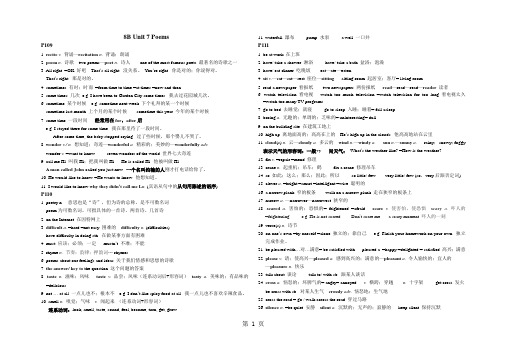
8B Unit 7 PoemsP1091. recite v. 背诵—recitation n. 背诵;朗诵2. poem n.诗歌---two poems—poet n.诗人one of the most famous poets 最著名的诗歌之一3. All right. =OK 好吧That’s all right. 没关系。
You’re right. 你是对的;你说得对。
That’s right. 那是对的。
4. sometimes 有时;时而=from time to time =at times =now and then5. some times 几次e.g. I have been to Garden City some times. 我去过花园城几次。
6. sometime 某个时候 e.g. sometime next week 下个礼拜的某一个时候sometime last month 上个月的某个时候sometime this year 今年的某个时候7. some time 一段时间经常用在for,after后e.g.I stayed there for some time. 我在那里待了一段时间。
After some time, the baby stopped crying. 过了些时候,那个婴儿不哭了。
8. wonder v./ n.想知道;奇迹—wonderful a.精彩的;美妙的—wonderfully adv.wonder v. =want to know seven wonders of the world 世界七大奇迹9. call me Hi 叫我Hi;把我叫做Hi He is called Hi. 他被叫做Hi.A man called John called you just now. 一个名叫约翰的人刚才打电话给你了。
10. He would like to know. =He wants to know. 他想知道。
牛津深圳版英语七年级下册Unit7Poems知识点梳理课件

2.It’s an important meeting. DDono’n’t be (not, be) late for it.
3. HHowow
wonderful the film is!
4. LLooookk (look) out! There are many cars on the road.
(well 好地 adv. well adj. 健康的)
12.shower:washing the body by standing under running water 淋
浴 n.
Unit 7 Poems
13.narrow:small Unit 7 Poems
Unit 7 Poems Unit 7 Poems
from
one
side
to
the
other,
not
wide
狭窄的
adj.
Unit 7 Poems
Unit 7 Poems
(narrowly Unit 7 Poems
Unit 7 Poems
狭窄地,勉强地
adv.)
Unit 7 Poems
Unit 7 Poems
14.height:distance from the base to the top 高度 n. (high 高的
他读书和看报为了知道今天有什么新鲜事。
3.Then I see him working, on the building site. 然后我看到他在建筑工地上工作。
4.He’s walking on a narrow piece of wood, not worried about the height, not afraid, not afraid like me. 他正走在一根狭窄的木头上,不担心高度,不害怕,不像我一 样害怕。
UNIT 7 POEMS知识点整理
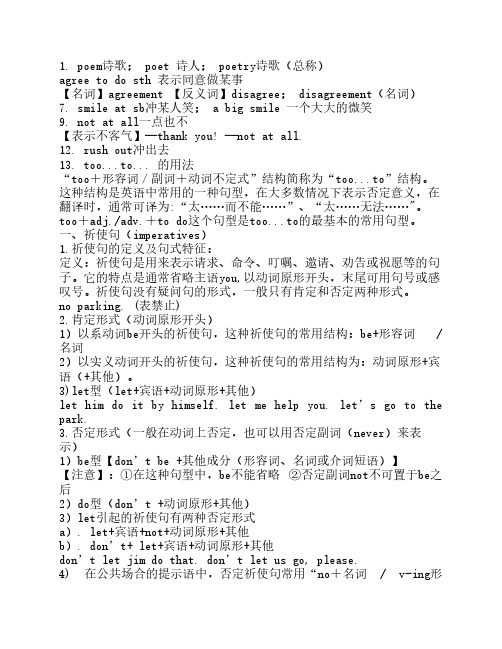
1. poem诗歌; poet 诗人; poetry诗歌(总称)agree to do sth 表示同意做某事【名词】agreement 【反义词】disagree; disagreement(名词)7. smile at sb冲某人笑; a big smile 一个大大的微笑9. not at all一点也不【表示不客气】--thank you! --not at all.12. rush out冲出去13. too...to... 的用法“too+形容词/副词+动词不定式”结构简称为“too...to”结构。
这种结构是英语中常用的一种句型,在大多数情况下表示否定意义,在翻译时,通常可译为:“太……而不能……”、“太……无法……"。
too+adj./adv.+to do这个句型是too...to的最基本的常用句型。
一、祈使句(imperatives)1.祈使句的定义及句式特征:定义:祈使句是用来表示请求、命令、叮嘱、邀请、劝告或祝愿等的句子。
它的特点是通常省略主语you,以动词原形开头,末尾可用句号或感叹号。
祈使句没有疑问句的形式,一般只有肯定和否定两种形式。
no parking. (表禁止)2.肯定形式(动词原形开头)1)以系动词be开头的祈使句,这种祈使句的常用结构:be+形容词 /名词2)以实义动词开头的祈使句,这种祈使句的常用结构为:动词原形+宾语(+其他)。
3)let型(let+宾语+动词原形+其他)let him do it by himself. let me help you. let’s go to the park.3.否定形式(一般在动词上否定,也可以用否定副词(never)来表示)1)be型【don’t be +其他成分(形容词、名词或介词短语)】【注意】:①在这种句型中,be不能省略 ②否定副词not不可置于be之后2)do型(don’t +动词原形+其他)3)let引起的祈使句有两种否定形式a). let+宾语+not+动词原形+其他b). don’t+ let+宾语+动词原形+其他don’t let jim do that. don’t let us go, please.4) 在公共场合的提示语中,否定祈使句常用“no+名词 / v-ing形式”结构,表示“禁止做某事”。
广州牛津版七年级下册Unit 7 Poems 语法讲解与练习
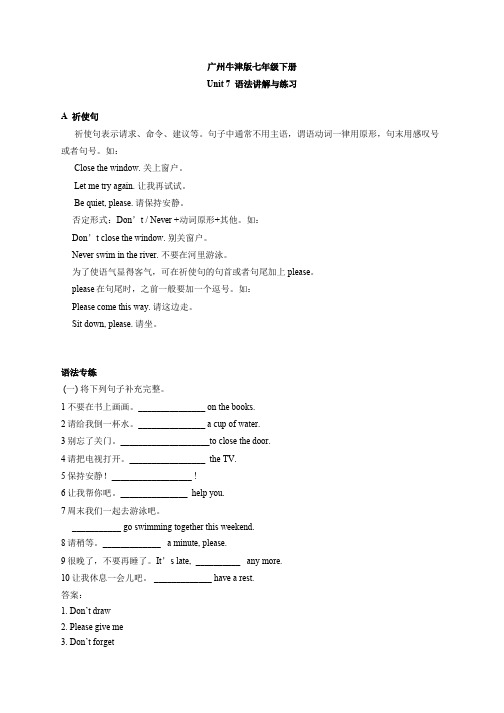
广州牛津版七年级下册Unit 7 语法讲解与练习A 祈使句祈使句表示请求、命令、建议等。
句子中通常不用主语,谓语动词一律用原形,句末用感叹号或者句号。
如:Close the window. 关上窗户。
Let me try again. 让我再试试。
Be quiet, please. 请保持安静。
否定形式:Don’t / Never +动词原形+其他。
如:Don’t close the window. 别关窗户。
Never swim in the river. 不要在河里游泳。
为了使语气显得客气,可在祈使句的句首或者句尾加上please。
please在句尾时,之前一般要加一个逗号。
如:Please come this way. 请这边走。
Sit down, please. 请坐。
语法专练(一) 将下列句子补充完整。
1不要在书上画画。
_______________ on the books.2请给我倒一杯水。
_______________ a cup of water.3别忘了关门。
____________________to close the door.4请把电视打开。
_________________ the TV.5保持安静!__________________ !6让我帮你吧。
_______________ help you.7周末我们一起去游泳吧。
___________ go swimming together this weekend.8请稍等。
_____________ a minute, please.9很晚了,不要再睡了。
It’s late, __________ any more.10让我休息一会儿吧。
_____________ have a rest.答案:1. Don’t draw2. Please give me3. Don’t forget4. Please turn on5. Be quiet6. Let me7. Let’s8. Wait9. do not sleep10. Let me(二) 单项选择。
unit7poems语法练习和词汇精讲
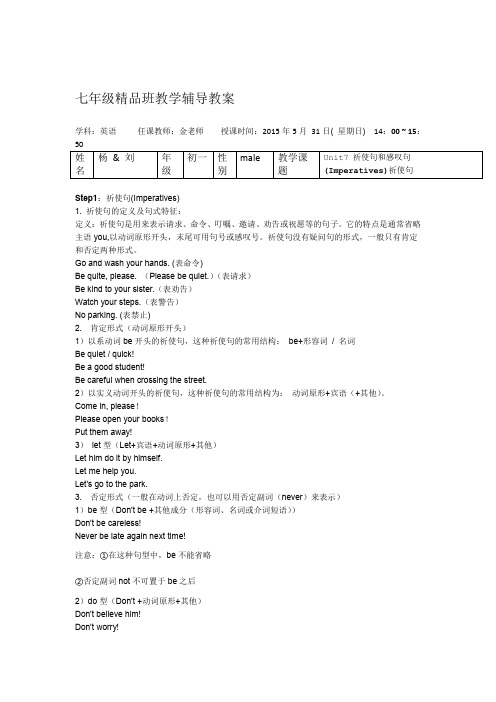
七年级精品班教学辅导教案学科:英语任课教师:金老师授课时间:2015年5月31日( 星期日) 14:00 ~ 15:Step1:祈使句(Imperatives)1. 祈使句的定义及句式特征:定义:祈使句是用来表示请求、命令、叮嘱、邀请、劝告或祝愿等的句子。
它的特点是通常省略主语you,以动词原形开头,末尾可用句号或感叹号。
祈使句没有疑问句的形式,一般只有肯定和否定两种形式。
Go and wash your hands. (表命令)Be quite, please. (Please be quiet.)(表请求)Be kind to your sister.(表劝告)Watch your steps.(表警告)No parking. (表禁止)2. 肯定形式(动词原形开头)1)以系动词be开头的祈使句,这种祈使句的常用结构:be+形容词/ 名词Be quiet / quick!Be a good student!Be careful when crossing the street.2)以实义动词开头的祈使句,这种祈使句的常用结构为:动词原形+宾语(+其他)。
Come in, please!Please open your books!Put them away!3)let型(Let+宾语+动词原形+其他)Let him do it by himself.Let me help you.Let's go to the park.3. 否定形式(一般在动词上否定,也可以用否定副词(never)来表示)1)be型(Don't be +其他成分(形容词、名词或介词短语))Don't be careless!Never be late again next time!注意:①在这种句型中,be不能省略②否定副词not不可置于be之后2)do型(Don't +动词原形+其他)Don't believe him!Don't worry!Never do it again!3)Let引起的祈使句有两种否定形式a. Let+宾语+not+动词原形+其他Let her not do that.Let's not think about it. It's only a waste of time.b. Don't+ let+宾语+动词原形+其他Don't let Jim do that.Don't let us go, please4) 在公共场合的提示语中,否定祈使句常用“No+名词/ V-ing形式”结构,表示“禁止做某事”。
Unit 7 Poems 语法讲义 2020-2021学年牛津深圳版英语七年级下册
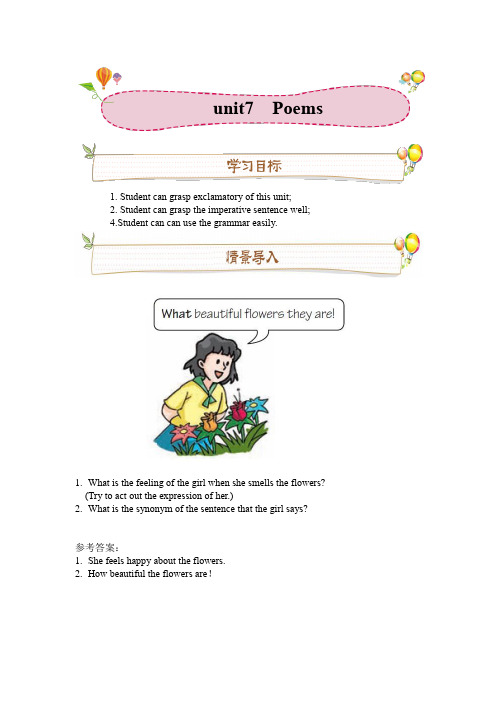
unit7 Poems1. Student can grasp exclamatory of this unit;2. Student can grasp the imperative sentence well;4.Student can can use the grammar easily.1.What is the feeling of the girl when she smells the flowers? (Try to act out the expression of her.)2.What is the synonym of the sentence that the girl says?参考答案:1.She feels happy about the flowers.2.How beautiful the flowers are!一.感叹句Exclamatory教材例句1. What an interesting poem it is!2. What beautiful flowers they are!3. How bright the starts are!以上三个句子含有丰富的感情色彩,表达自己的感受,句子末尾都用了感叹号,用what 或how 开头,这是感叹句。
基本表达概念用来表达喜、怒、哀、乐等强烈感情色彩的句子,叫感叹句。
感叹句用what 或how 引导,句末常用感叹号。
例:What a clever boy he is!How tall the man is!感叹句的具体构成感叹句是用来表达说话人对某人、某物或某件事表示赞美、惊讶、喜悦、气愤或悲哀等语气的句子,这类句子有强烈的感情,句尾用感叹号。
感叹句通常由how或what引出。
⒈如果对句子中的名词或名词词组表示感叹,用what引出。
⒈ What+a/an+adj.+单数名词+主语+谓语(+其他成分)!其中主语和谓语可以省略。
Unit7PoemsVocabulary词汇讲解课件共23张PPT
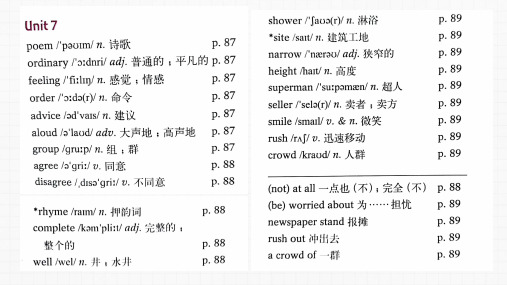
aloud
/ə'laʊd/
adv. 大声地,高声地 = loudly
loud adj. 大声的,吵闹的
1. 请大声朗读这首诗。
Please _r_e_a__d_ _a__lo__u_d__ this poem.
2. 音乐太吵了,请把它调低点。
The music __i_s__ _t_o_o_ _l_o_u__d_. Please turn it down.
advise /əd'vaɪz/ v. 建议 advise sb (not) to do sth
建议某人(不要)做某事
a piece of advice 一个建议
advise /əd‘vaɪz/ v. 建议
advice on/about sth 关于…的建议 advise sb (not) to do sth
/haɪt/
the height of … …的高度
1. 广州塔的高度是多少?
What ___is___ _t_h_e__ h__e_i_g_h__t __o_f__ the Canton Tower.
形容词(adj.) high 高的 long 长的 wide 宽的 deep 深的
名词(n.) height 高度 length 长度 width 宽度 depth 深度
2. 不用担心天气,明天会是晴天。
Don’t _w__o_r_r_y_ __a_b_o__u_t_ the weather. Tomorrow will be a sunny day.
Thank you
v.
make sb/sth + adj.
but I _c_o__m__p_l_e_t_e_l_y_ have no idea what to do.
7B Unit 7 Poems 单元字词语法与练习
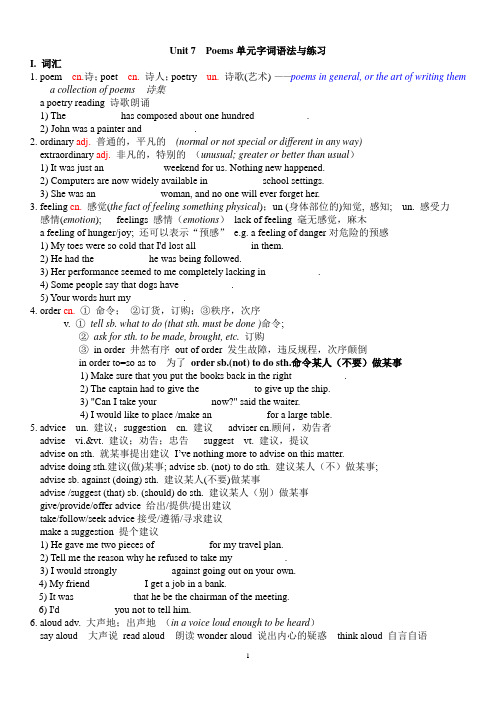
Unit 7 Poems单元字词语法与练习I. 词汇1. poem cn.诗;poet cn.诗人;poetry un. 诗歌(艺术)——poems in general, or the art of writing thema collection of poems 诗集a poetry reading 诗歌朗诵1) The __________ has composed about one hundred __________.2) John was a painter and __________.2. ordinary adj.普通的,平凡的(normal or not special or different in any way)extraordinary adj. 非凡的,特别的(unusual; greater or better than usual)1) It was just an ___________ weekend for us. Nothing new happened.2) Computers are now widely available in __________ school settings.3) She was an ____________ woman, and no one will ever forget her.3. feeling cn.感觉(the fact of feeling something physical);un (身体部位的)知觉, 感知; un. 感受力感情(emotion); feelings 感情(emotions)lack of feeling 毫无感觉,麻木a feeling of hunger/joy; 还可以表示“预感”e.g. a feeling of danger对危险的预感1) My toes were so cold that I'd lost all __________ in them.2) He had the __________ he was being followed.3) Her performance seemed to me completely lacking in __________.4) Some people say that dogs have __________.5) Your words hurt my __________.4. order cn.①命令;②订货,订购;③秩序,次序v. ①tell sb. what to do (that sth. must be done )命令;②ask for sth. to be made, brought, etc. 订购③in order 井然有序out of order 发生故障,违反规程,次序颠倒in order to=so as to 为了order sb.(not) to do sth.命令某人(不要)做某事1) Make sure that you put the books back in the right __________.2) The captain had to give the __________ to give up the ship.3) "Can I take your __________ now?" said the waiter.4) I would like to place /make an __________ for a large table.5. advice un. 建议;suggestion cn. 建议adviser cn.顾问,劝告者advise vi.&vt. 建议;劝告;忠告suggest vt. 建议,提议advise on sth. 就某事提出建议I’ve nothing more to advise on this matter.advise doing sth.建议(做)某事; advise sb. (not) to do sth. 建议某人(不)做某事;advise sb. against (doing) sth. 建议某人(不要)做某事advise /suggest (that) sb. (should) do sth. 建议某人(别)做某事give/provide/offer advice 给出/提供/提出建议take/follow/seek advice 接受/遵循/寻求建议make a suggestion 提个建议1) He gave me two pieces of __________ for my travel plan.2) Tell me the reason why he refused to take my __________.3) I would strongly __________ against going out on your own.4) My friend __________ I get a job in a bank.5) It was ___________ that he be the chairman of the meeting.6) I'd __________ you not to tell him.6. aloud adv. 大声地;出声地(in a voice loud enough to be heard)say aloud 大声说read aloud 朗读wonder aloud 说出内心的疑惑think aloud 自言自语groan aloud 大声呻吟loudly adv. 大声地;高声地= loud adv.You need to speak quite loudly for the people at the back.loud adj. 大声的,喧闹的loud adv. 响亮的,大声的【口】in a way that makes a lot of noise.= loudly1) Mary reads __________ the sign on the wall.2) Ben laughed __________ and happily when the teacher came in.7. group cn. 组;群 a group of ...一群...; in groups 以小组形式We discussed the problems in __________.8.agree vt.&vi.同意(have the same opinion about something)disagree vi. &vt.不同意agree/disagree that + 句子agreement cn. 商定;协议(书);un. (意见)一致,同意disagreement cn.&un.分歧;争论; 不一致agree to do sth 同意做某事agree to sth 接受、认可某事物(如计划、建议、安排等)agree with sb 同意或赞成某人意见(或所说的话)agree on sth 商定某事1) They agree ________ the date for the next meeting.2) In a way, I agree ___________ Mary /Mary's opinion.3) Do your parents agree ____________ the plan?4) She agreed _________ (go) on business to another city.5) Kate and I often ___________ with each other. So we often end up with a quarrel.9. rhyme cn. 押韵词;un. 押韵vi. 押韵“Hat” rhymes with “cat”.vt.用…押韵rhyme sth. with sth.1) ----What are the __________ of the poem? ---- All, waterfall; smell, well; rain, again.2) Does "dad" __________ with ""bed"?10. complete adj. “完整的,整个的”vt. “完成”completion un. 完成;结束(the state of being finished)incomplete adj. 不完整的; incompletely adv. 不完整地;completeness un.完整(性)1) Can you tell me the __________ story?2) He'd __________ changed - I didn't recognize him.3) My dad bought the __________ works of Shakespeare for me as a present.4) I still need half an hour to __________ my homework.11. (not) at all 一点也(不);完全(不)(used to make negatives and questions stronger) in any way or ofany typee.g. Let's climb the mountain. I am not tired at all.我完全不在意,老实说,一点关系都没有。
unit7poems语法练习和词汇精讲
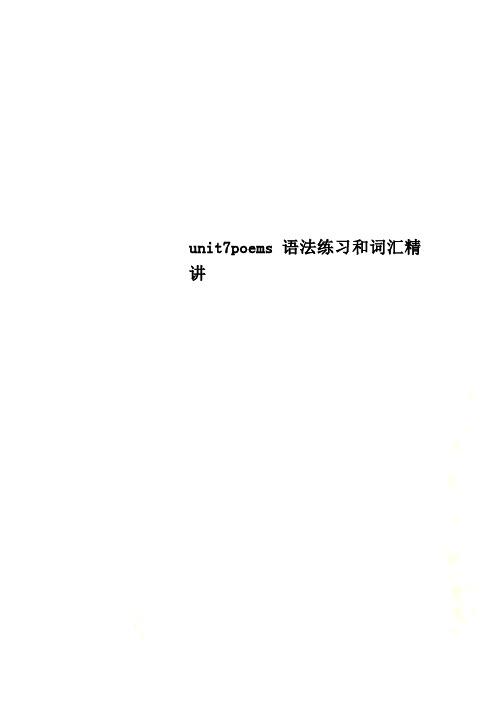
unit7poems语法练习和词汇精讲七年级精品班教学辅导教案学科:英语任课教师:金老师授课时间:2015年5Step1:祈使句(Imperatives)1. 祈使句的定义及句式特征:定义:祈使句是用来表示请求、命令、叮嘱、邀请、劝告或祝愿等的句子。
它的特点是通常省略主语you,以动词原形开头,末尾可用句号或感叹号。
祈使句没有疑问句的形式,一般只有肯定和否定两种形式。
Go and wash your hands. (表命令)Be quite, please. (Please be quiet.)(表请求)Be kind to your sister.(表劝告)Watch your steps.(表警告)No parking. (表禁止)2. 肯定形式(动词原形开头)1)以系动词be开头的祈使句,这种祈使句的常用结构:be+形容词/ 名词Be quiet / quick!Be a good student!Be careful when crossing the street.2)以实义动词开头的祈使句,这种祈使句的常用结构为:动词原形+宾语(+其他)。
Come in, please!Please open your books!Put them away!3)let型(Let+宾语+动词原形+其他)Let him do it by himself.Let me help you.Let’s go to the park.3. 否定形式(一般在动词上否定,也可以用否定副词(never)来表示)1)be型(Don’t be +其他成分(形容词、名词或介词短语))Don’t be careless!Never be late again next time!注意:①在这种句型中,be不能省略②否定副词not不可置于be之后2)do型(Don’t +动词原形+其他)Don’t believe him!Don’t worry!Never do it again!3)Let引起的祈使句有两种否定形式a. Let+宾语+not+动词原形+其他Let her not do that.Let’s not think about it. It’s only a waste of time.b. Don’t+ let+宾语+动词原形+其他Don’t let Jim do that.Don’t let us go, please4) 在公共场合的提示语中,否定祈使句常用“No+名词/ V-ing形式”结构,表示“禁止做某事”。
unit7poems语法练习和词汇精讲
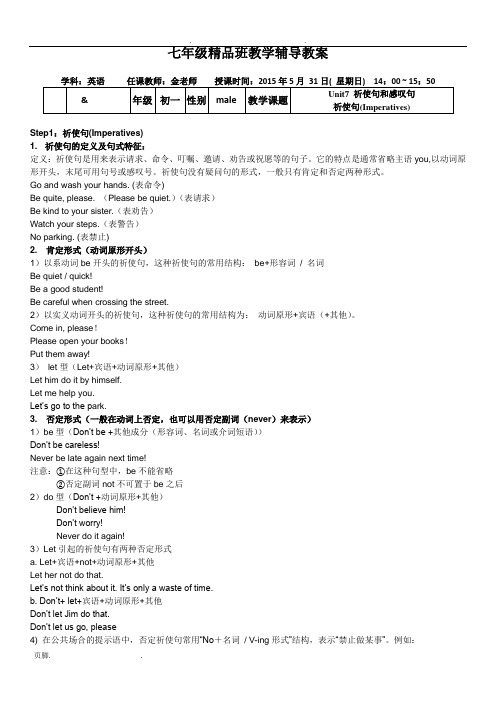
七年级精品班教学辅导教案Step1:祈使句(Imperatives)1. 祈使句的定义及句式特征:定义:祈使句是用来表示请求、命令、叮嘱、邀请、劝告或祝愿等的句子。
它的特点是通常省略主语you,以动词原形开头,末尾可用句号或感叹号。
祈使句没有疑问句的形式,一般只有肯定和否定两种形式。
Go and wash your hands. (表命令)Be quite, please. (Please be quiet.)(表请求)Be kind to your sister.(表劝告)Watch your steps.(表警告)No parking. (表禁止)2. 肯定形式(动词原形开头)1)以系动词be开头的祈使句,这种祈使句的常用结构:be+形容词/ 名词Be quiet / quick!Be a good student!Be careful when crossing the street.2)以实义动词开头的祈使句,这种祈使句的常用结构为:动词原形+宾语(+其他)。
Come in, please!Please open your books!Put them away!3)let型(Let+宾语+动词原形+其他)Let him do it by himself.Let me help you.Let’s go to the p ark.3. 否定形式(一般在动词上否定,也可以用否定副词(never)来表示)1)be型(Don’t be +其他成分(形容词、名词或介词短语))Don’t be careless!Never be late again next time!注意:①在这种句型中,be不能省略②否定副词not不可置于be之后2)do型(Don’t +动词原形+其他)Don’t believe him!Don’t worry!Never do it again!3)Let引起的祈使句有两种否定形式a. Let+宾语+not+动词原形+其他Let her not do that.Let’s not think about it. It’s only a waste of time.b. Don’t+ let+宾语+动词原形+其他Don’t let Jim do that.Don’t let us go, please4) 在公共场合的提示语中,否定祈使句常用“No+名词/ V-ing形式”结构,表示“禁止做某事”。
新版广州深圳牛津英语七年级下册unit7poems知识点与练习
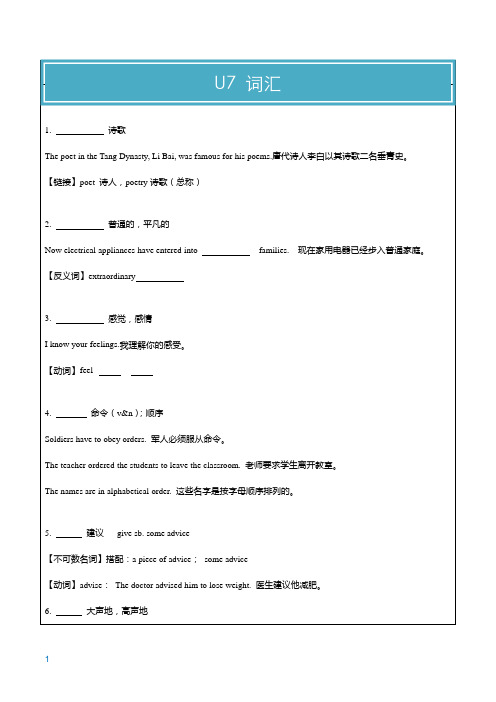
I read the story to my younger sister.我给妹妹大声朗读这个故事。
【近义词】loudly7.组,群【搭配】a of+名词复数:一群,一伙8.同意1)with sb/sth同意某人的意见,想法,分析,解释I quite agree with you.我很赞同你的看法。
We agree with what you say.我们同意你说的。
2)not agree with sb对...不适应The food doesn’t agree with me.这食物对我不适合。
3)agree with sth表示与...一致/符合His story agrees with the facts.他的描述与事实符合。
4)agree to sth表示同意或答应某事He agreed to the plan.他同意了这个计划。
5)agree to do sth表示同意做某事We agreed to leave early.我们同意早点出发。
【名词】agreement【反义词】disagree;disagreement(名词)9.押韵词;押韵Can you think of for“beauty”?你能想出和“beauty”押韵的词吗?“Dogs”with“frogs”.“dogs”和“frogs”押韵。
10.完整的,整个的He is a scholar.他是个无懈可击的学者。
【动词:完成】I will this task soon.我很快就要完成这项任务了。
【副词:完全地】I completely forgot it was your birthday.那天是你的生日,我忘得一干二净了。
11.井,水井【副词】;【形容词】12.淋浴;阵雨Take a淋浴;take a bath:洗澡13.建筑工地14.狭窄的A gap:狭小的缝隙【反义词】wide15.高度【链接】high--height;wide--width;long--length;deep-depth;strong--strength16.超人17.卖者;卖方【反义词】buyer18.微笑(n&v)Smile at sb:冲某人笑;a big smile一个大大的微笑19.迅速移动Don’t off,I want to talk to you.不要急着走,我有话跟你说。
七年级英语下册Unit7 Poems期末知识学习总结要点汇总
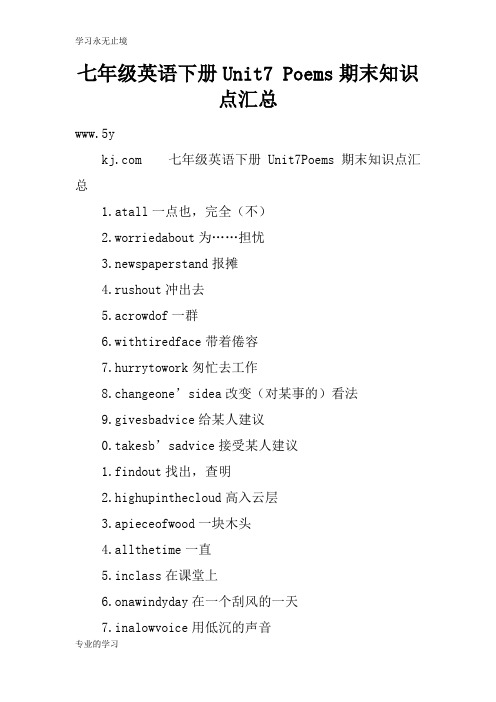
七年级英语下册Unit7 Poems期末知识点汇总www.5y 七年级英语下册Unit7Poems期末知识点汇总1.atall一点也,完全(不)2.worriedabout为……担忧3.newspaperstand报摊4.rushout冲出去5.acrowdof一群6.withtiredface带着倦容7.hurrytowork匆忙去工作8.changeone’sidea改变(对某事的)看法9.givesbadvice给某人建议0.takesb’sadvice接受某人建议1.findout找出,查明2.highupinthecloud高入云层3.apieceofwood一块木头4.allthetime一直5.inclass在课堂上6.onawindyday在一个刮风的一天7.inalowvoice用低沉的声音8.leavethedooropen让门开着9.onmyway在我的路上20comeup接近,发生21.followtherules遵守规则22.cleanup打扫23.knockonthedoor敲门24.fromdawntodusk从黎明到黄昏,从早到晚25.keepoutcitygreen保持我们的城市绿色26.looklike看起来像27.thinkof.认为,想起Gettingready.Readtwopoemsaboutordinarypeople.读两首关于普通人的诗歌.ordinary普通的;平凡的outoftheordinary不平常;非凡2.Listentofourshortpoemsaboutfeelings.听关于情感的短诗.feel连系动词意为”感到,感觉”Ifeelverytiredtoday.我今天感到非常累.feel及物动词,意为”感觉,触摸”.Ifeltthehouseshakeyesterday.昨天我感到非常累.3.Learnhowtouseimperativestogiveordersoradvice.学会如何使用祈使句给出命令或建议.order这里用作名词,意为”命令”也可以是动词”命令”Thisisanorder.这是命令.Thepoliceorderedthemtowaitrightthere.警察命令他们就在那儿等候.order及物动词,意为”订购,点菜”Iwanttoorderaticket.我想订一张票.advice不可数名词,意为”劝告,建议”.apieceofadvice 一条建议Theteacheroftengivesadvicetohisstudents.这个老师经常给他的学生提建议.4.Readapoemaloudinagroup.在小组里大声读诗.aloud副词,意为”出声地;高声地”.Pleasereadthetextaloud.请朗读一下课文.----missLi,couldyougiveme______onEnglishlearning?----certainly.FirstyoushouldspeakEnglisheveryday.A.anyadvicesB.manyadvicesc.someadviceReading.agreeto同意……(意见),to后多接表示计划、建议、安排、决定等的名词或代词。
新沪教版英语初初一下册Unit 7 Poems(基础知识)
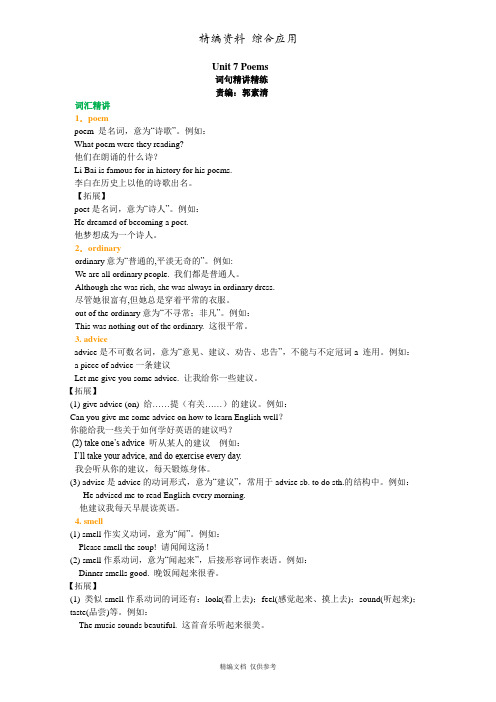
Unit 7 Poems词句精讲精练责编:郭素清词汇精讲1.poempoem 是名词,意为“诗歌”。
例如:What poem were they reading?他们在朗诵的什么诗?Li Bai is famous for in history for his poems.李白在历史上以他的诗歌出名。
【拓展】poet是名词,意为“诗人”。
例如:He dreamed of becoming a poet.他梦想成为一个诗人。
2.ordinaryordinary意为“普通的,平淡无奇的”。
例如:We are all ordinary people. 我们都是普通人。
Although she was rich, she was always in ordinary dress.尽管她很富有,但她总是穿着平常的衣服。
out of the ordinary意为“不寻常;非凡”。
例如:This was nothing out of the ordinary. 这很平常。
3. adviceadvice是不可数名词,意为“意见、建议、劝告、忠告”,不能与不定冠词a 连用。
例如:a piece of advice一条建议Let me give you some advice. 让我给你一些建议。
【拓展】(1) give advice (on) 给……提(有关……)的建议。
例如:Can you give me some advice on how to learn English well?你能给我一些关于如何学好英语的建议吗?(2) take one’s advice 听从某人的建议例如:I’ll take your advice, and do exercise every day.我会听从你的建议,每天锻炼身体。
(3) advise是advice的动词形式,意为“建议”,常用于advise sb. to do sth.的结构中。
(word)新深圳牛津版七年级英语下Unit7poems语法复习及练习2
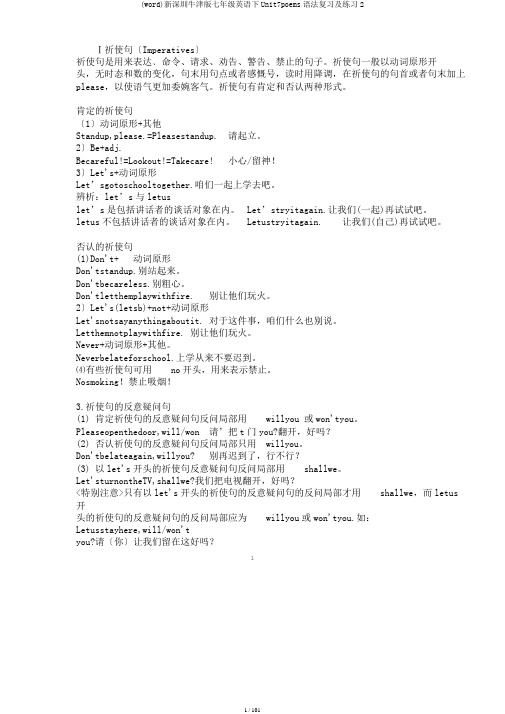
Ⅰ祈使句〔Imperatives〕祈使句是用来表达﹑命令、请求、劝告、警告、禁止的句子。
祈使句一般以动词原形开头,无时态和数的变化,句末用句点或者感慨号,读时用降调,在祈使句的句首或者句末加上please,以使语气更加委婉客气。
祈使句有肯定和否认两种形式。
肯定的祈使句〔1〕动词原形+其他Standup,please.=Pleasestandup. 请起立。
2〕Be+adj.Becareful!=Lookout!=Takecare! 小心/留神!3〕Let's+动词原形Let’sgotoschooltogether.咱们一起上学去吧。
辨析:let’s与letuslet’s是包括讲话者的谈话对象在内。
Let’stryitagain.让我们(一起)再试试吧。
letus不包括讲话者的谈话对象在内。
Letustryitagain. 让我们(自己)再试试吧。
否认的祈使句(1)Don't+ 动词原形Don'tstandup.别站起来。
Don'tbecareless.别粗心。
Don'tletthemplaywithfire. 别让他们玩火。
2〕Let's(letsb)+not+动词原形Let'snotsayanythingaboutit. 对于这件事,咱们什么也别说。
Letthemnotplaywithfire. 别让他们玩火。
Never+动词原形+其他。
Neverbelateforschool.上学从来不要迟到。
⑷有些祈使句可用no开头,用来表示禁止。
Nosmoking!禁止吸烟!3.祈使句的反意疑问句(1) 肯定祈使句的反意疑问句反问局部用willyou 或won'tyou。
Pleaseopenthedoor,will/won 请’把t门you?翻开,好吗?(2) 否认祈使句的反意疑问句反问局部只用willyou。
Don'tbelateagain,willyou? 别再迟到了,行不行?(3) 以let's开头的祈使句反意疑问句反问局部用shallwe。
- 1、下载文档前请自行甄别文档内容的完整性,平台不提供额外的编辑、内容补充、找答案等附加服务。
- 2、"仅部分预览"的文档,不可在线预览部分如存在完整性等问题,可反馈申请退款(可完整预览的文档不适用该条件!)。
- 3、如文档侵犯您的权益,请联系客服反馈,我们会尽快为您处理(人工客服工作时间:9:00-18:30)。
七年级精品班教学辅导教案学科:英语任课教师:金老师授课时间:2015年5月31日( 星期日) 14:00 ~ 15:50姓名杨& 刘年级初一性别male 教学课题Unit7 祈使句和感叹句祈使句(Imperatives)Step1:祈使句(Imperatives)1. 祈使句的定义及句式特征:定义:祈使句是用来表示请求、命令、叮嘱、邀请、劝告或祝愿等的句子。
它的特点是通常省略主语you,以动词原形开头,末尾可用句号或感叹号。
祈使句没有疑问句的形式,一般只有肯定和否定两种形式。
Go and wash your hands. (表命令)Be quite, please. (Please be quiet.)(表请求)Be kind to your sister.(表劝告)Watch your steps.(表警告)No parking. (表禁止)2. 肯定形式(动词原形开头)1)以系动词be开头的祈使句,这种祈使句的常用结构:be+形容词/ 名词Be quiet / quick!Be a good student!Be careful when crossing the street.2)以实义动词开头的祈使句,这种祈使句的常用结构为:动词原形+宾语(+其他)。
Come in, please!Please open your books!Put them away!3)let型(Let+宾语+动词原形+其他)Let him do it by himself.Let me help you.Let‟s go to the p ark.3. 否定形式(一般在动词上否定,也可以用否定副词(never)来表示)1)be型(Don‟t be +其他成分(形容词、名词或介词短语))Don‟t be careless!Never be late again next time!注意:①在这种句型中,be不能省略②否定副词not不可置于be之后2)do型(Don‟t +动词原形+其他)Don‟t believe him!Don‟t worry!Never do it again!3)Let引起的祈使句有两种否定形式a. Let+宾语+not+动词原形+其他Let her not do that.Let‟s not think about it. It‟s only a waste of time.b. Don‟t+ let+宾语+动词原形+其他Don‟t let Jim do that.Don‟t let us go, please4) 在公共场合的提示语中,否定祈使句常用“No+名词/ V-ing形式”结构,表示“禁止做某事”。
例如:NO PHOTOS! 禁止拍照!No parking! No fishing! No smoking!注意:1). 在表达请求或劝告时,有时为了表示委婉的语气,可以在句首或句末please,但是如果please加在句末,应用逗号将其与前面的部分隔开。
Sit down, please. Please look after the twins.2). 在意思比较明显的情况下,可以把谓语动词省略。
This way, please.3). 有时为了加强语气,可以在动词前使用do. Do be careful!一定要小心!4). 有时为了强调对方,也可加上主语you,人名或everybody, anybody等不定代词。
You sweep the floor and I clean the window.Stand up, everybody.5).有时为了明确向谁提出请求或发出命令,可加称呼语,但称呼语要与句子用逗号隔开。
Put the shirt on the bed, Jim.4.祈使句的回答祈使句的动作通常是表示将来发生的动作,所以回答祈使句时,一般用will或won‟t。
在回答具有否定意义的祈使句时,要注意两点:1) 形式一致(即Yes与will保持一致;No与won‟t保持一致)2) 意思相反(即Yes是“不”的意思;No是“是”的意思)。
在回答时,要注意分析上下文语境中所提供的条件。
例如:--- Don‟t go out, please. It‟s raining heavily outside. 请不要出去。
外面雨下得很大。
--- Yes, I will. I have to meet my brother at the airport. 不行,我得去机场接我弟弟。
Step2:感叹句(Exclamations)感叹句是用来表达说话人对某人、某物或某件事表示赞美、惊讶、喜悦、气愤或悲哀等语气的句子,这类句子有强烈的感情,句尾用感叹号。
感叹句通常由how或what引出。
⒈如果对句子中的名词或名词词组表示感叹,用what引出。
⑴ What+a/an+adj.+单数名词+主语+谓语(+其他成分)!其中主语和谓语可以省略。
What an interesting book (it is)!What a good girl she is!What an interesting poem it is !⑵ What+ adj.+名词复数/不可数名词+主语+谓语(+其他成分)!其中主语和谓语可以省略。
What good students they are!What beautiful flowers they are!What bad weather it is!⒉如果对句子中的形容词、副词或动词表示感叹,用how引导。
⑴ How+adj./adv.+主语+谓语(+其他成分)!How hot it is today!How lucky we are!How fast he runs!How quickly the time passed!How hard the people are working!这些人们工作多努力啊!⑵ How+主语+谓语!How time flies! 时间过得真快呀!感叹句练习I. 将下列句子变成感叹句:1. It is q uite a nice present.→_____ _____ nice present!2. We have fine weather today.→ _____ _____ weather we have today!3. It‟s sunny today.→_____ _____ sunny day it is today!4. The children are working hard.→_____ _____ the children are working!5. She played basketball wonderfully.→_____ _____ she played basketball!6. He is good at singing.→_____ _____ he sings!7. He was doing well in dancing.→_____ a _____ dancer he was!8. Tom coughs badly.→_____ _____ _____ cough Tom has!9. The fish is very lovely.→_____ _____ the fish is!10. They live a happy life today.→_____ _____ _____ life they live!II. 选择题1. ____ a nice watch it is!(1998山东)A. HowB. WhatC. What aD. How a2. ____ bright girls they are!(1998浙江)A. WhatB. What aC. HowD. how a3. ____ interesting the film is!(1998湖北)A. WhatB. What anC. How4. ____ sunny day! Let‟s go out for a walk.(1999江西)A. How aB. HowC. What aD. What5. ____ hard work it is!(1999浙江)A. HowB. WhatC. What aD. What an6. ____ day it is! It‟s rainy again. (1999江西)A. How badB. What a badC. How fineD. What a fine7. ____ great day July 1,1997 will be! (1999上海)A. How aB. What aC. HowD. What8. ____ expensive trousers!(1999浙江)A. WhatB. What aC. HowD. What an9. ____ girl she is!(1998河北)A. What bright aB. How a brightC. How bright aD. What bright10. ____ weather we have today!(1983上海)A. A fineB. What a fineC. How a fineD. What fine11. ____ careless he is!(1986吉林)A. WhatB. HowC. So muchD. How much12. ____ from Beijing to London!(1993黑龙江)A. How long way it isB. What a long way is itC. How long way is itD. What a long way it is13. Oh, John, ____ you gave us!(1990内蒙古)A. How a pleasant surpriseB. How pleasant surpriseC. What a pleasant surpriseD. What pleasant surprise14. ____ useful work they have done!(2000上海)A. WhatB. HowC. What aD. What an15. ____ nice picture you gave me!(2000杭州) A. How B. What C. What a D. What an祈使句练习I. 选择题。
1. Please ____, they‟re having a meeting.(1998黑龙江)A. not be so noisyB. Be quiteC. mustn‟t talkD. no speaking2. ____ to meet me at the station. I‟ll be waiting there.(河北)A. Not to forgetB. Not forgetC. Forget notD. Don‟t forget3. It‟s a fine day. Let‟s go fishing, ____?(1990北京西城区)A. won‟t weB. will youC. don‟t weD. shall we4. Don‟t smoke in the meeting-room, ____?(1999天津)A. do youB. will youC. can youD. could you5. –Don‟t forget to come to my birthday party tomorrow. -I ____.A. don‟tB. won‟tC. can‟tD. haven‟t6. ____ down the radio. The baby‟s asleep in the next room.A. TurningB. To turnC. TurnedD. Turn7. Lucy, ____ the do or or someone‟ll come in.(1996河南)A. closeB. closesC. not closeD. is closing8. ____ and play football in the street after lunch.(哈尔滨)A. Let‟s not to goB. Let‟s not goC. Let‟s don‟t goD. Not let‟s go9. A sign with the words“____” is often found in a bus.(安徽)A. Not parkingB. Not smokingC. No parkingD. No smoking10. ____ Chinese in you English class.(2000西安)A. Not speakB. Don‟t speakC. Speak notD. Don‟t speakingII. 将下列句子变成祈使句:1. Would you like to wait a moment?→_____ _____ a moment.2. Can I use your bike?→Please _____ _____ your bike.3. You‟d better not smoke here.→_____ _____ here.4. You must be careful with your handwriting._____ _____ with your handwriting.5. Will you please not play with my pencil? →____ ____ with my pencil,____.Step3:一、选词填空,需注意用适当的形式。
